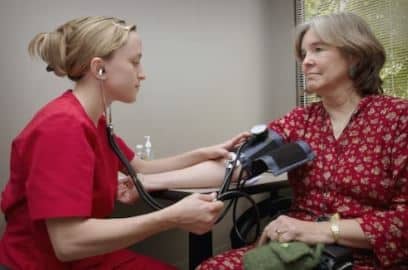Study Shows Blood Pressure Levels Rose During Pandemic

WASHINGTON — Adults with hypertension saw a small but consequential rise in their blood pressure levels during the first eight months of the COVID-19 pandemic, while the number of times they had their blood pressure measured dropped significantly, according to a new study.
The findings appear in the journal Hypertension.
According to the researchers, the study represents one of the most extensive looks at blood pressure trends during the early months of the pandemic.
Using data from three large U.S. health care systems, the findings also add to growing evidence that blood pressure control worsened in people with hypertension during this period.
Still, the researchers say, the situation was not nearly as dire as they expected, possibly due to the rapid adoption of telemedicine and home blood pressure monitoring.
The successful use of these alternatives to in-person office visits offers a reason to be optimistic about improving blood pressure control in future disasters and public health emergencies, they said.
During the study, which was funded through the the National Heart, Lung, and Blood Institute, researchers looked at the electronic data records of 137,593 adults with hypertension and compared blood pressure outcomes before the pandemic (August 2018 through January 2020) with those during the peak of the pandemic (April 2020 through January 2021).
The data came from three large health systems: Cedars-Sinai in Los Angeles, California; Columbia University Irving Medical Center in New York City, New York; and Ochsner Health in New Orleans, Louisiana.
The average age of the patients was 66 years, and 57% were female and 30% were Black.
The researchers discovered first that the number of blood pressure measurements patients had taken declined significantly in the first three months of the pandemic — by as much as 90% compared to before the pandemic.
While these measurements gradually ticked up as the months passed, the total number of readings at the end of the study period remained below pre-pandemic levels. The researchers believe this was partly because of cancellations or postponements of face-to-face office visits.
The researchers also looked at individual blood pressure readings and the proportion of patients with sustained blood pressure levels of less than 140/90 millimeters of mercury (mmHg) — the widely used marker for high blood pressure.
They found that the patients’ systolic readings (the top number) rose on average by 1.79 mmHg, while their diastolic readings (the bottom number) rose on average by 1.30 mmHg. Although these increases appear small, studies show that just a 2 mmHg increase in blood pressure can raise the risk of major cardiovascular events by as much as 5%.
“We expected blood pressure control to be worse due to decreased physical activity, stress, poor sleep, and other cardiovascular disease risk factors that worsened during the pandemic,” said study leader Dr. Hiroshi Gotanda, Ph.D., an assistant professor in the Division of General Internal Medicine at Cedars-Sinai Medical Center.
“But the results were better than we expected, probably because of the use of telemedicine and home monitoring of blood pressure.
“We now know that blood pressure may be relatively controlled using technology,” continued Gotanda in a written statement. “That’s an important take-home message when we encounter other public health emergencies in the future.”
The researchers now plan to explore the impact of these slight blood pressure increases on long-term cardiovascular health outcomes, such as stroke and heart attack incidence, as well as determine whether some groups may have had difficulty accessing telehealth resources.
Past studies show that patients from certain racial or ethnic minority groups, or with limited English proficiency or low digital literacy are less likely to access telemedicine tools.
Hypertension, or high blood pressure, affects over 1 billion people worldwide. Researchers have known for some time that poor blood pressure control is a risk factor for cardiovascular disease, including heart attack and stroke, as well as a risk factor for more severe COVID-19 disease.
Yet, blood pressure control remains an ongoing challenge: Only about one in four U.S. adults with hypertension have their condition under control, according to the Centers for Disease Control and Prevention.
Dan can be reached at [email protected] and at https://twitter.com/DanMcCue.

























